
Models of Modals
From Pragmatics and Corpus Linguistics to Machine Learning
- 280 pages
- English
- ePUB (mobile friendly)
- Available on iOS & Android
Models of Modals
From Pragmatics and Corpus Linguistics to Machine Learning
About This Book
Modal verbs in English communicate delicate shades of meaning, there being a large range of verbs both on the necessity side ( must, have to, should, ought to, need, need to ) and the possibility side ( can, may, could, might, be able to ). They therefore constitute excellent test ground to apply and compare different methodologies that can lay bare the factors that drive the speaker's choice of modal verb. This book is not merely concerned with a purely grammatical description of the use of modal verbs, but aims at advancing our understanding of lexical and grammatical units in general and of linguistic methodologies to explore these. It thus involves a genuine effort to compare, assess and combine a variety of approaches. It complements the leading descriptive qualitative work on modal verbs by testing a diverse range of quantitative methods, while not ignoring qualitative issues pertaining to the semantics-pragmatics interface. Starting from a critical assessment of what constitutes the meaning of modal verbs, different types of empirical studies (usage-based, data-driven and experimental), drawing considerably on the same data sets, shows how method triangulation can contribute to an enhanced understanding. Due attention is also given to individual variation as well as the degree to which modals can predict L2 proficiency level.
Frequently asked questions
Information
Table of contents
- Title Page
- Copyright
- Contents
- Introduction
- 1 English modals: An outline of their forms, meanings and uses
- 2 Modality revisited: Combining insights from Construction Grammar and Relevance Theory
- 3 Possibility modals: Which conditions make them possible?
- 4 Necessity modals and the role of source as a predictive factor
- 5 You must/have to choose: Experimenting with choices between near-synonymous modals
- 6 Does the intersubjectivity of modal verbs boost inter-individual differences?
- 7 Modals as a predictive factor for L2 proficiency level
- 8 Revisiting modal sense classification with contextual word embeddings
- 9 Modals in the network model of Construction Grammar
- Index